Digital modernization is the strategic integration of advanced technologies into a company’s systems, processes, and infrastructures to enhance efficiency, agility, customer experience, and competitiveness. As a crucial component of digital transformation, modernization focuses on enhancing existing investments, enabling businesses to innovate without starting from scratch while supporting the broader goals of transforming operations and achieving digital excellence.
This process demands more than technological upgrades; it requires cultural shifts, organizational restructuring, and a reevaluation of business models. By embracing modernization, businesses can unlock new revenue streams while staying relevant in a competitive market.
Central to this transformation are cloud, app, and data modernization, three interconnected pillars that form the foundation of digital growth. Together, they empower organizations to optimize costs, improve agility, engage customers, secure operations, and deliver better outcomes in a rapidly changing digital landscape.
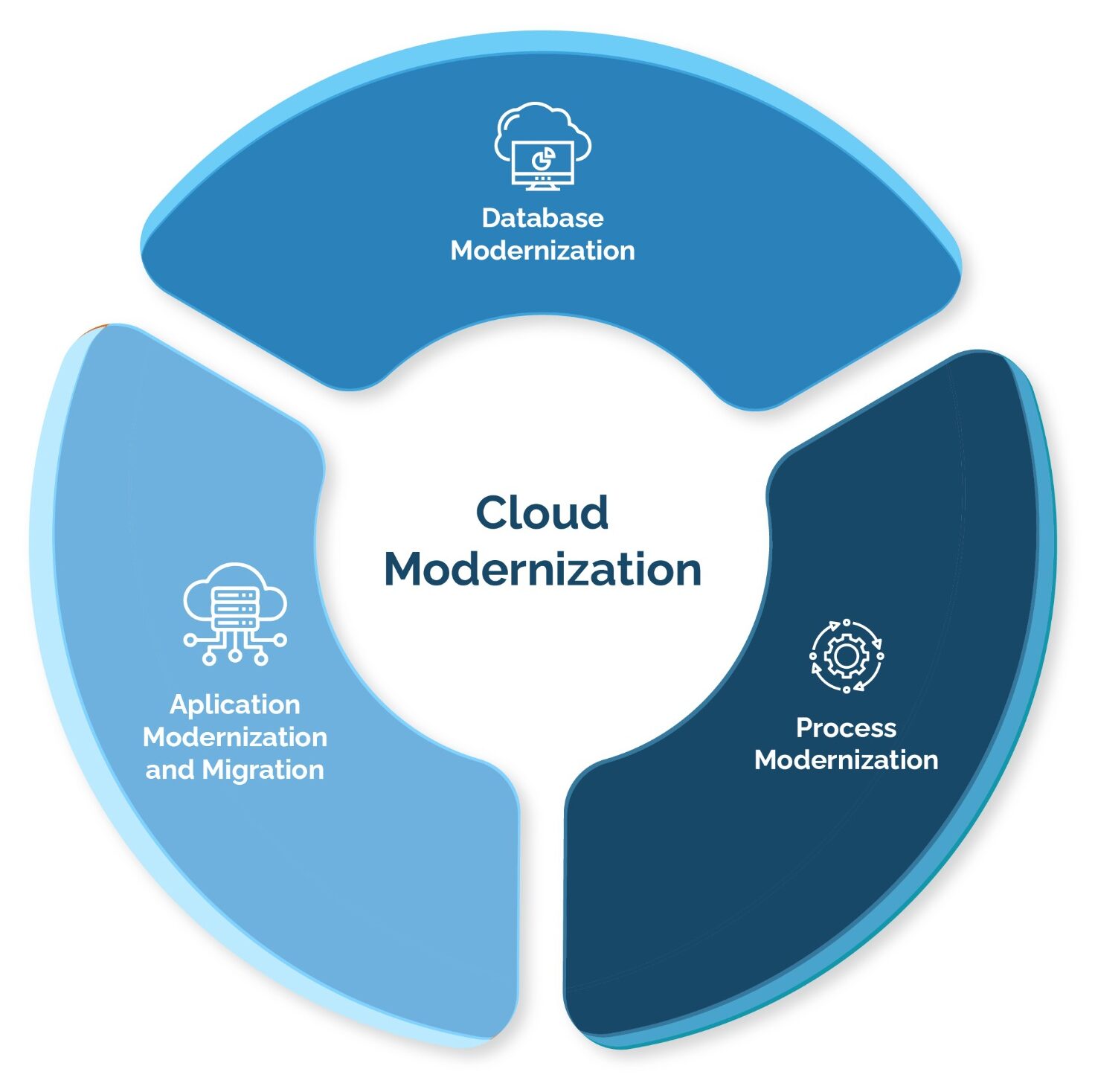
Cloud Modernization: Foundation for Transformation
Cloud modernization is the cornerstone of digital transformation, offering a scalable and integrated framework for optimizing operations. The global cloud migration market underscores its importance, projected to grow from $232.51 billion in 2024 to $806.41 billion by 2029 at a 28.24% CAGR, as per Mordor Intelligence. Key trends like serverless computing, microservices, and AI-powered automation are transforming how businesses approach modernization.
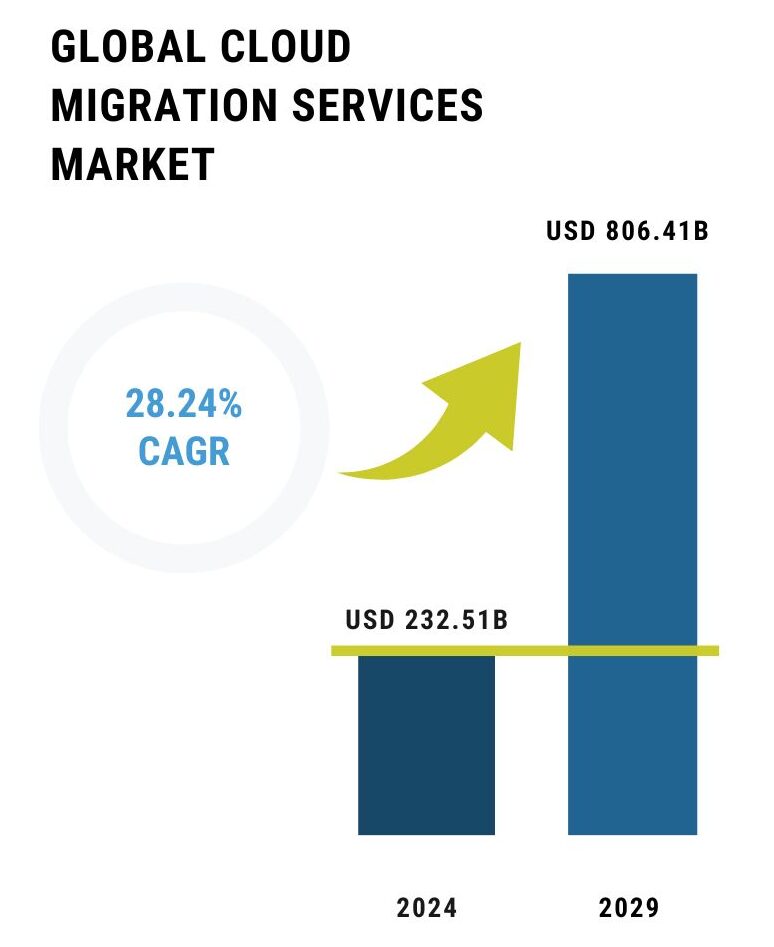
Cloud modernization enables seamless shifts from traditional infrastructure to elastic cloud environments. Cloud-native architectures, characterized by microservices, containerization, and serverless computing, facilitate agility and scalability. Hybrid and multi-cloud strategies provide flexibility while maintaining compliance and resilience. These architectures ensure high performance and integration across systems, making them a linchpin for app and data modernization.
Modernization strategies such as replatforming, refactoring, and rearchitecting enable businesses to optimize operations without sacrificing continuity. Cloud’s inherent scalability allows real-time resource adjustments, ensuring cost efficiency and uninterrupted service. Leaders like AWS, Microsoft Azure, and Google Cloud are at the forefront, empowering businesses to leverage AI, DevOps, and microservices to optimize resource utilization and accelerate innovation. Cloud modernization is not merely a technical upgrade but the foundation for comprehensive digital growth.
App Modernization: Reimagining Legacy Systems
Application modernization redefines legacy systems to meet modern needs, improving scalability, functionality, and security. With the market expected to grow from $19.82 billion in 2024 to $39.62 billion by 2029 at a 14.8% CAGR, according to Markets and Markets, businesses recognize the urgency of upgrading outdated systems. Trends like mobile-first strategies, hybrid environments, and API-first approaches are reshaping how organizations modernize their applications.
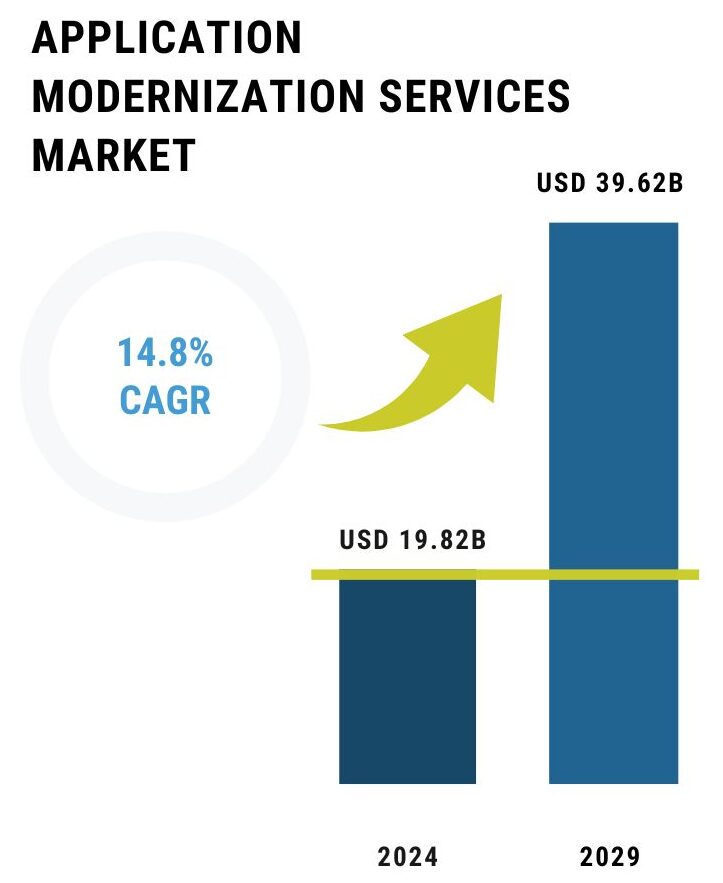
Modernization transforms how applications are designed, deployed, and managed. Tools such as containerization ensure consistent performance across environments, while microservices decouple applications for independent development and scaling. DevOps practices, including Continuous Integration/Continuous Delivery (CI/CD), streamline workflows, ensuring faster time-to-market and greater reliability.
The adoption of serverless computing further enhances efficiency, enabling applications to run only when needed, reducing operational overhead. Businesses integrate advanced analytics powered by AI/ML to unlock new insights and drive growth. Prominent players like IBM, Accenture, and Infosys lead the charge, offering tailored solutions to address high migration costs, skill gaps, and compatibility challenges.
Application modernization is a strategic imperative for businesses seeking to remain agile and competitive in today’s rapidly evolving digital landscape. It involves more than just upgrading outdated systems; it requires a comprehensive approach that aligns technology with business goals to drive innovation and deliver enhanced customer experiences. By adopting modular architectures, leveraging cloud platforms, and implementing DevOps practices, organizations can dismantle the constraints of monolithic systems and position themselves for future growth.
High migration costs, dependencies on outdated infrastructure, and gaps in technical expertise often hinder progress. To overcome these barriers, modernization efforts include end-to-end services—from detailed assessments and strategy development to implementation and continuous support. This ensures that businesses can navigate complexities effectively while minimizing risks and disruptions. By integrating cutting-edge technologies like containerization, microservices, and automation, organizations can achieve faster development cycles, reduce operational overhead, and maintain resilience in competitive markets.
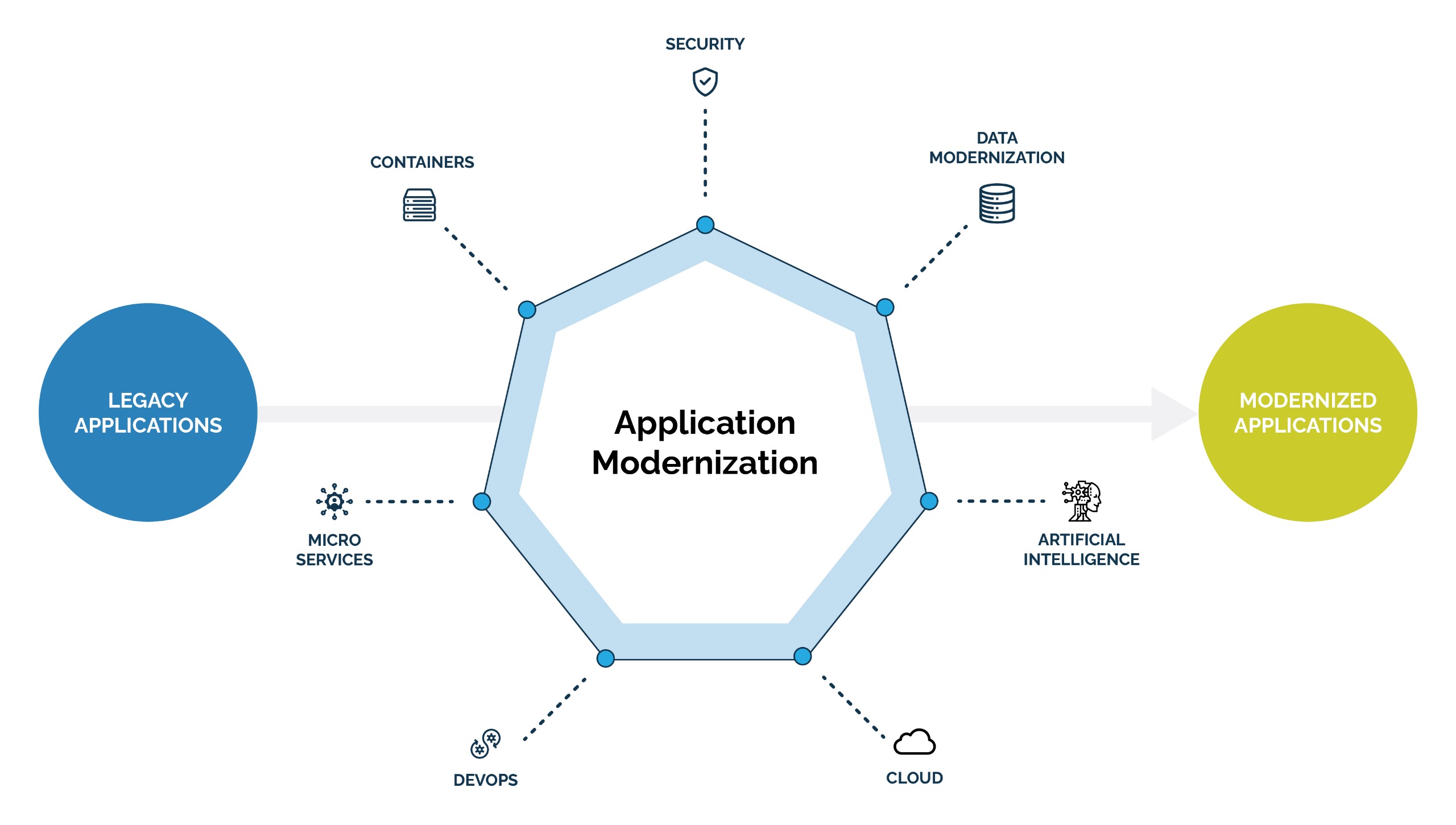
Data Modernization: Unlocking Insights in a Digital-First World
Data modernization redefines how businesses manage, store, and analyze data, enabling actionable insights and strategic decision-making. With the market, as reported by Business Research Insights, projected to grow from $8.8 billion in 2024 to $21.7 billion by 2032 at a 12% CAGR, organizations are prioritizing modern data solutions. Key drivers include the integration of AI, ML, and IoT, alongside the demand for real-time analytics capabilities.
Modernization shifts data management from rigid on-premises systems to flexible, cloud-based architectures. Data lakes and warehouses are central to this evolution, offering cost-effective storage for unstructured data and powerful analytics for structured datasets. By integrating these frameworks with AI/ML-powered analytics, businesses gain predictive insights and enhance decision-making.
Cloud storage capabilities form the backbone of modern data systems, enabling scalability, security, and seamless integration. Real-time analytics powered by cloud infrastructure enhances data accessibility and processing speed, ensuring organizations remain responsive to market demands. Elastic storage scales resources dynamically, optimizing costs and fostering collaboration.
Trends such as hybrid cloud adoption, real-time analytics, and AI-driven processing are reshaping industries. Regional dynamics highlight North America’s leadership and Asia-Pacific’s rapid growth, driven by big data analytics adoption. Companies like IBM, Microsoft Azure, and SAP provide cutting-edge solutions for data migration and modernization.
Data modernization is not merely about upgrading infrastructure; it’s about creating dynamic, integrated ecosystems that drive innovation and growth. By embracing cloud-enabled frameworks and advanced analytics, businesses can future-proof their data infrastructure, ensuring agility and resilience in a data-driven world.
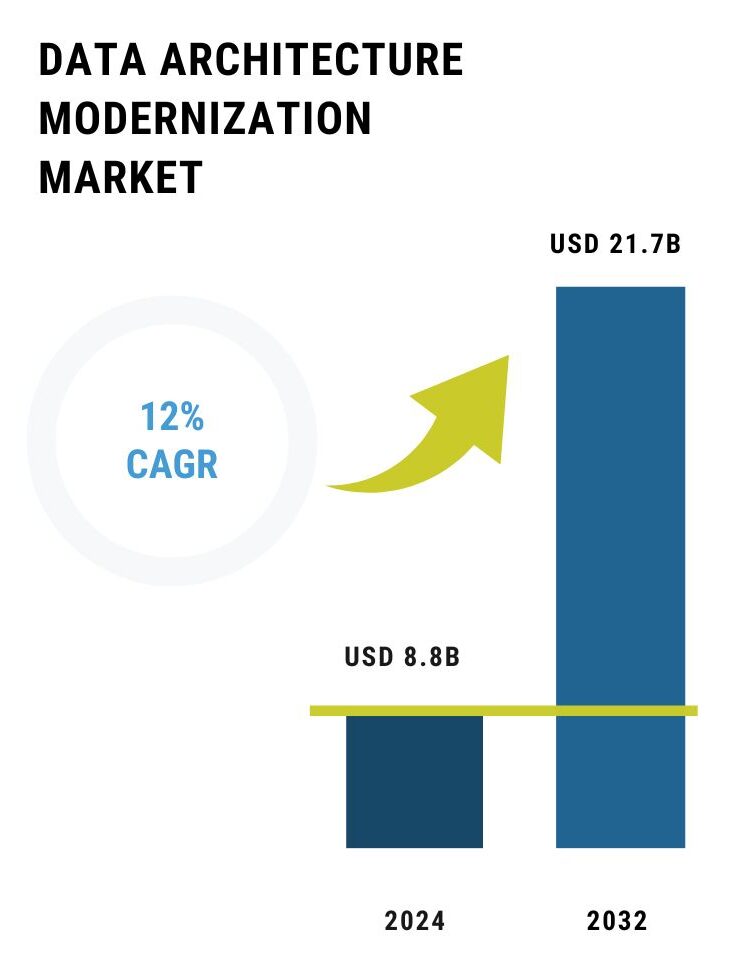
Merger & Acquisition trends and notable transactions
The landscape of mergers and acquisitions (M&A) in the modernization space reflects the accelerating pace of digital transformation across industries. With the cloud migration market projected to reach $505.85 billion by 2028, the application modernization market forecasted to grow to $42.64 billion in the same period, and the data modernization market expected to hit $21.7 billion by 2032, companies are increasingly leveraging strategic acquisitions to enhance their capabilities. This trend is driven by mid-market strategic and PE investors increasingly looking to build out and scale cross-domain capabilities across cloud-native architectures, advanced analytics powered by AI/ML, and integrated modernization frameworks through strategic investments or M&A. The choice of building organically to risk being left behind in the increasingly competitive and high-growth modernisation market is a choice not worth considering for most investors. We see increased allocation of capital from our clients and investors towards acquiring specialized modernisation firms which have differentiated capabilities address critical needs such as mainframe modernization, data migration, and the integration of cloud and AI technologies, where we could scale revenues through a large Go-To-Market expansion in the US, UK and Western Europe. These symbiotic synergistic strategic investments not only enhance scalability, agility, and innovation but enable entrepreneurs to unlock multi-fold growth and accelerated value creation through a win-win participative investment model.

ITC Infotech India Limited, a wholly-owned subsidiary of ITC Limited and a leading provider of IT services and digital solutions, has acquired Blazeclan Technologies, a global cloud solutions firm. Blazeclan, headquartered in Pune, India, is an AWS Premier Partner and Snowflake Elite Partner with expertise in cloud migration, digital cloud consulting, data analytics, and digital services, and operates across multiple geographies, including India, Singapore, Australia, the USA, and Canada.
This acquisition strengthens ITC Infotech’s capabilities in providing multi-cloud and hybrid cloud solutions, enhancing its ability to navigate clients’ digital transformation journeys. By integrating Blazeclan’s expertise in cloud transformation and its established partner ecosystem, ITC Infotech is positioned to deliver business outcomes rooted in robust cloud capabilities and drive accelerated growth across global markets.

Onix, a Google Cloud partner specializing in cloud migration, application modernization, geospatial solutions, and generative AI, has acquired Datametica, a prominent IP-powered consulting firm. Headquartered in Pune, India, Datametica excels in data migration, modernization, and analytics, leveraging proprietary products to automate and accelerate these processes for Google Cloud customers.
This acquisition integrates Onix’s cloud expertise with Datametica’s strengths in data migration and analytics, enabling the combined organization to deliver comprehensive, data-driven solutions for enterprise transformation. Operating in over 20 countries, the new entity services more than 1,800 customers across industries, with a focus on accelerating AI and data value creation. The combined capabilities position Onix and Datametica as a powerhouse in cloud transformation, data modernization, and AI, delivering unmatched outcomes to businesses worldwide.

nClouds, an Amazon Web Services (AWS) Premier Tier Services Partner and leader in cloud and data migrations, application modernization, managed services, and DevOps, has acquired Foghorn Consulting, a fellow AWS Premier Tier Services Partner specializing in cloud security, migration, and application modernization services. Established in San Francisco, Foghorn Consulting brings over a decade of experience as an AWS Premier Tier Partner and a highly credentialed team of cloud engineers with expertise in infrastructure as code (IaC), CI/CD pipelines, and self-healing environments.
The acquisition enhances nClouds’ portfolio, combining its North America-leading AWS SaaS Competency with Foghorn’s capabilities across AWS Security, Migration, and DevOps Competencies. Together, the two organizations aim to deliver comprehensive and innovative cloud solutions to address the evolving needs of industries such as healthcare, life sciences, software, financial services, manufacturing, energy, and the public sector. This milestone marks a significant step for nClouds, enabling it to accelerate innovation and expand operations, including geographic reach and support for both public and commercial sector clients.

Happiest Minds Technologies Limited, a 'Born Digital. Born Agile' IT company with a strong focus on digital transformation and application modernization, has acquired USA-based Azure-native digital product engineering firm, Aureus Tech Systems LLC. Headquartered in Denver, Colorado, with a development center in Hyderabad, Aureus specializes in digital transformation using Data, AI, and Application Modernization. With a workforce of 150 professionals, Aureus serves Fortune 500 companies in the insurance, reinsurance, healthcare, and life sciences sectors, leveraging its expertise as a Microsoft-Certified Gold & Co-sell Partner for Digital & App Innovation (Azure).
This acquisition bolsters Happiest Minds’ capabilities in the BFSI (Banking, Financial Services, and Insurance), Healthcare, and Life Sciences verticals while strengthening its Product & Digital Engineering Services (PDES) business. By integrating Aureus, Happiest Minds enhances its domain expertise, expands its value proposition, and gains access to a strong customer base with long-term digital transformation goals. Additionally, the integration enables cross-selling and up-selling of offerings such as infrastructure, security, automation, analytics, and GenAI solutions to Aureus’ clients, positioning Happiest Minds for accelerated growth. This partnership underscores a shared commitment to delivering tech-enabled business outcomes and driving digital transformation across critical industry sectors.
Conclusion
Modernization is a complex but essential journey, requiring a strategic blend of application, cloud, and data transformation strategy and a multi-year phased roadmap which is unique for each enterprise based on their transformation objectives, internal or external investments and timeframes among other key parameters. SA Global Advisors (SA) is a leading global investment banking firm specializing in Strategic investments and M&A transactions within the Technology, Media, and Telecom (TMT) sectors, helps entrepreneurs and investors navigate this transformation in the Modernisation industry by underwriting your vision with strategic growth capital to realize this opportunity. With expertise in driving growth through partnerships, investments, and acquisitions, SA is committed to helping businesses thrive in the evolving digital landscape. Modernization isn’t just about technology—it’s about having the right growth-minded investment partners to make it a reality.
To share feedback on this blog or explore a potential transaction opportunity you may be considering, please write to us at [email protected]
Newsletter Subscription
SubscribeREAD NEXT
- Smart, Connected, and Autonomous: The Role of Digital Engineering in Next-Gen Vehicle
- Opportunities in Generative AI: Fueling Innovation and Strategic Growth
- Digital Engineering: Powering Innovation & Growth Across Mission-Critical Industries
- Weaving the Future: How Data Fabric Powers Enterprise Transformation
- Thriving in the ServiceNow Ecosystem: Strategies for Growth 2.0
Subscribe
Stay current with our latest insights in your inbox.


